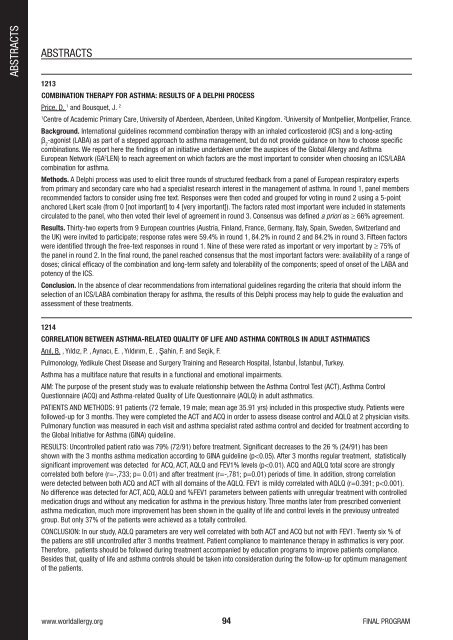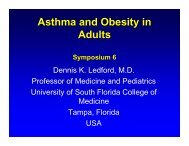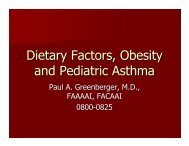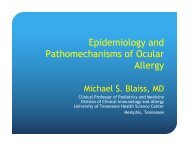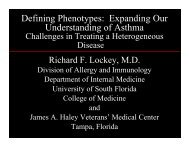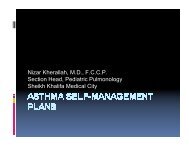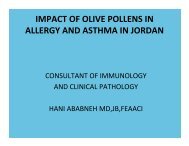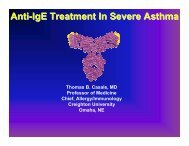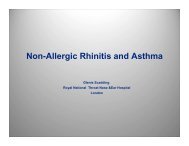Dubai Final-v20.indd - World Allergy Organization
Dubai Final-v20.indd - World Allergy Organization
Dubai Final-v20.indd - World Allergy Organization
You also want an ePaper? Increase the reach of your titles
YUMPU automatically turns print PDFs into web optimized ePapers that Google loves.
ABstrACts<br />
ABstrACts<br />
1213<br />
ComBinaTion THEraPY For aSTHma: rESUlTS oF a DElPHi ProCESS<br />
Price, D. 1 and Bousquet, J. 2<br />
1 2 Centre of Academic Primary Care, University of Aberdeen, Aberdeen, United Kingdom. University of montpellier, montpellier, France.<br />
Background. international guidelines recommend combination therapy with an inhaled corticosteroid (iCs) and a long-acting<br />
β -agonist (lABA) as part of a stepped approach to asthma management, but do not provide guidance on how to choose specific<br />
2<br />
combinations. We report here the findings of an initiative undertaken under the auspices of the global <strong>Allergy</strong> and Asthma<br />
European network (gA2lEn) to reach agreement on which factors are the most important to consider when choosing an iCs/lABA<br />
combination for asthma.<br />
methods. A Delphi process was used to elicit three rounds of structured feedback from a panel of European respiratory experts<br />
from primary and secondary care who had a specialist research interest in the management of asthma. in round 1, panel members<br />
recommended factors to consider using free text. responses were then coded and grouped for voting in round 2 using a 5-point<br />
anchored likert scale (from 0 [not important] to 4 [very important]). the factors rated most important were included in statements<br />
circulated to the panel, who then voted their level of agreement in round 3. Consensus was defined a priori as ≥ 66% agreement.<br />
results. thirty-two experts from 9 European countries (Austria, Finland, France, germany, italy, spain, sweden, switzerland and<br />
the UK) were invited to participate; response rates were 59.4% in round 1, 84.2% in round 2 and 84.2% in round 3. Fifteen factors<br />
were identified through the free-text responses in round 1. nine of these were rated as important or very important by ≥ 75% of<br />
the panel in round 2. in the final round, the panel reached consensus that the most important factors were: availability of a range of<br />
doses; clinical efficacy of the combination and long-term safety and tolerability of the components; speed of onset of the lABA and<br />
potency of the iCs.<br />
Conclusion. in the absence of clear recommendations from international guidelines regarding the criteria that should inform the<br />
selection of an iCs/lABA combination therapy for asthma, the results of this Delphi process may help to guide the evaluation and<br />
assessment of these treatments.<br />
1214<br />
CorrElaTion BETWEEn aSTHma-rElaTED QUaliTY oF liFE anD aSTHma ConTrolS in aDUlT aSTHmaTiCS<br />
Anıl, B. , Yıldız, P. , Aynacı, E. , Yıldırım, E. , Şahin, F. and seçik, F.<br />
Pulmonology, Yedikule Chest Disease and surgery training and research Hospital, İstanbul, İstanbul, turkey.<br />
Asthma has a multiface nature that results in a functional and emotional impairments.<br />
Aim: the purpose of the present study was to evaluate relationship between the Asthma Control test (ACt), Asthma Control<br />
Questionnaire (ACQ) and Asthma-related Quality of life Questionnaire (AQlQ) in adult asthmatics.<br />
PAtiEnts AnD mEtHODs: 91 patients (72 female, 19 male; mean age 35.91 yrs) included in this prospective study. Patients were<br />
followed-up for 3 months. they were completed the ACt and ACQ in order to assess disease control and AQlQ at 2 physician visits.<br />
Pulmonary function was measured in each visit and asthma specialist rated asthma control and decided for treatment according to<br />
the global initiative for Asthma (ginA) quideline.<br />
rEsUlts: Uncontrolled patient ratio was 79% (72/91) before treatment. significant decreases to the 26 % (24/91) has been<br />
shown with the 3 months asthma medication according to ginA guideline (p


